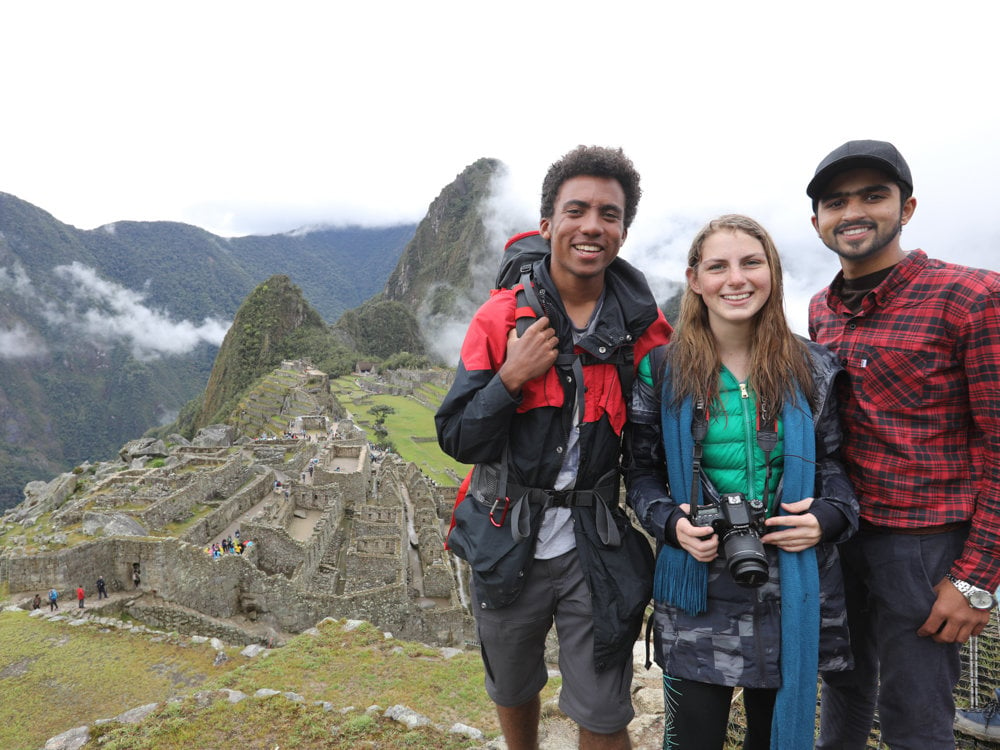20 Pro Tips for Doing Your Gap Year on a Budget
Save money with these 20 tips and tricks for lowering the cost of a gap year.

One of the biggest worries for students considering a gap year is money. Many think that because you don’t have piles of cash stashed away you’ll never be able to explore the world before heading to college. We’re happy to tell you not only is this untrue but quite the contrary: you can totally have an amazing gap year on a budget and we’ll show you exactly how.
Would it be easier to just be rich and not have to worry about hacks and tricks? Yes, but you wouldn’t be reading this article if you were blessed with that circumstance. So take heed of these expert budget tips and get ready for a gap year to remember, regardless of your financial circumstance.
Pssst! You should also read: How to Take a Gap Year for Free or Cheap
Gap Year Crash Course: Scholarships & Funding
Learn even more about funding opportunities for your gap time with this recorded webinar from the 2021 USA Gap Year Fairs series!
Choose The Right Gap Year Destinations For Your Budget
Where you choose to spend your gap year will ultimately determine how much you'll have to spend abroad. Some locations will clearly demonstrate your necessary financial commitment, while others may seem cheap but later hit your bank account with unexpected costs. Here are three things to know before you decide on a destination.
Tip #1: Pick a Budget-Friendly Country
When choosing the perfect gap year, you want to focus on a few key elements: your budget, your bucket list, and your ultimate goals. Gap year programs can be budget-friendly, just be sure to consider the destinations’ economic health and program offerings before you book.
For example: if you want to learn a new language while exploring a famous UNESCO world heritage site consider a budget gap year in Peru.
Tip #2: Research Costs of Living
Once you’ve tentatively decided on a destination, do a Google search to check out the living costs for the country you’re headed to. This way you can work out an estimation as to how much you can expect to spend each day. Places like Southeast Asia, South America, and Eastern Europe are perfect regions for the budget traveler: the food is inexpensive, the accommodations are reasonable, and the transportation can get you from one end of the country to the other for cheap.
Tip #3: Pay Attention to Exchange Rates
Currency exchange is an important factor to consider when booking your gap year destination. One country’s cost of living for locals may be much more accessible to someone coming from a country with a stronger currency. When visiting Canada’s big cities, for instance, American travelers enjoy the perks of a stronger dollar -- and people from the UK may prefer the currency perks of visiting the USA. Watch exchange rate fluctuations closely though: it can change quickly!
Don’t Wait To Plan Logistics

If you're taking a gap year to embrace your own Eat, Pray, Love journey, remember that the famous book's protagonist and author spent a lot of money. Her free-spirited, enriching experiences were booked to her heart's desire and a budget-friendly gap year wasn't exactly her priority. This doesn't mean your experience won't be transformative but it does mean you might have to put more time and effort into planning.
Tip #4: Book Your Travel at the Right Time
At this point you will have decided on a gap year program or destination. Now it is time to confirm logistics. Do this step as early as possible to save money, as most things are cheaper when secured in advance. Trains, buses, and planes offer early bird specials at seriously good discounts, but you will need to be organized with a roughly mapped-out itinerary to plan effectively.
Tip #5: Plan for Visas, Vaccinations & Passport Fees
If you haven’t already filed for necessary visas, vaccinations, and passport fees, get on it! These must-haves will take the longest to secure and will cost a lot if you need to expedite them. Most countries will not let you in if they aren't taken care of -- which means you'd have to spend even more money to replan your trip.
Tip #6: Cut Out the Middle Man
To avoid hassles and a headache, many people choose to ask either a tour company or immersion program for help when traveling abroad long-term. While this saves you a ton of time and stress, it is a hefty investment. If you want to plan your gap year on a budget, cut out the middleman and do the research yourself. There are loads of blogs and travel sites that offer up-to-date tips and guides (Go Overseas's blog is a great place to start!). Not only will you save money, you’ll also feel a great sense of achievement.
Remember These Essential Money Tips
Long-term trips like a gap year require budgeting and money smarts if you want to save while traveling. Costs that seem small will add up, and convenience is synonymous with expensive. Here are a few tips you should keep in mind when managing your money if you want to have a budget-friendly gap year abroad.
Tip #7: Don't Exchange Money at the Airport
A common mistake for new travelers, exchanging money at the airport is like giving your money away. Yes, it’s convenient -- that’s why they charge a hefty commission fee. But if you’re on a budget you might have to let convenience slide. Take out enough for a taxi or bus ride and wait until you get into the city to exchange your money; you’ll find much better exchange rates.
Tip #8: Avoid Carrying Too Much Cash
A common saying: "Never carry more cash than you can afford to lose." Besides cash having the least amount of insurance (if lost or stolen, it is gone with little chance of returning), carrying cash is an easy way to lose track of your budget. A bill here and there, a coin everywhere: next thing you know it will be the end of the day and you have no idea where your money was spent. Credit card charges are a better option and can be disputed if fraudulent.
Tip #9: Use a Budgeting App
Tracking spending is essential if you’re on a tight budget. Work out a realistic estimate of major expenses before you take your gap year and download an expense app to refer to as you travel. As of late, my favorite free app is called TrabeePocket: I enter my overall budget, categorize my credit and cash spending along the way, and easily see when I’m getting too close to my limit.
Tip #10: Use a Currency Card
A preloaded currency card looks like a debit card -– you load cash onto it through your bank before you leave and spend it while abroad. You get a fixed exchange rate so if you buy it on a day where the exchange rate is good, you keep it at that rate until all the money is spent. The perks: they do not have overdraft fees and if lost, can be replaced with a new card without losing your balance. Alternatively, make sure your credit card does not have foreign transaction fees.
Have a Flexible Itinerary

Flexibility is key if you're looking for the best ways to save money during your gap year. The more adaptable you are, the more you'll find tricks and loopholes that won't compromise your experience. Keep these two tips in mind when planning your itinerary and you'll immediately see the financial benefits.
Tip #11: Be Flexible in the Length of Your Gap Year
Taking a gap year doesn’t mean the entire year has to be spent away. If you have a small budget, try a series of shorter international tours and trips or volunteer positions during your year off instead. These can span for a few weeks to a few months, with breaks in between.
Tip #12: Travel Overnight Rather than During the Day
With a flexible itinerary, overnight travel can really save you money. You’ll get to your destination with a full day to explore and save on accommodation -- just be sure to bring earplugs and an eye mask since you'll technically be sleeping in public quarters. Sleeper trains and buses are available in loads of places and some of them can be much comfier than you’d think (including curtains!)
Choose Alternative Gap Year Experiences
Not every gap year is the same -- and that's okay! In fact, alternative experiences might promote deeper immersion at an even lower cost. Along with a flexible itinerary, try stepping away from traditional gap year formats and get in touch with locals and nature for a more budget-friendly experience.
Tip #13: Go Camping
There are plenty of programs that offer gap year adventures in the wilderness (and in turn might help you save on city expenses). If you choose a place like Australia for your gap year, accommodations can be super expensive. But embracing minimalism and heading outdoors can offer a new perspective while saving money.
Tip #14: Become a Volunteer
Some gappers love to barter during their year abroad. Offer your skills to an organization in exchange for your accommodation (and sometimes food) for free. Volunteering also looks really great on your CV, making it a perfect conversation starter when you return home. Organizations like WWOOF are a great place to start for long-term volunteer placements that use the bartering system.
Tip #15: Hang Out with the Locals
In order to truly discover a culture, you need to talk to locals: see how they live, ask them questions, and do what they do. Locals can show you places that aren’t in the guidebooks, they can cook your food for a real taste of their country, and they can tell you things that you’d never learn on your own. As a bonus, this alternative style of touring will make you start living more on a local’s budget too!
Watch Out For Small Fees

We highlighted money management skills to embrace before and during your trip, but have you considered the pesky hidden fees that come with travel? Even if you are confident with your budgeting skills, all travelers get hit with these unexpected costs while abroad at some point. Always pay attention to the fine print and never be afraid to ask questions.
Tip #16: Watch Out for Room Comfort Fees
You may be surprised to learn hot water and air conditioning is a luxury in some countries. And this luxury might cost you extra money per night! Skip out on your western room comforts while abroad and opt for cold showers and fan-cooling. If you truly can’t live without these comforts, book multi-bed dorm rooms with air conditioning and shared bathrooms with hot water as a compromise (but honestly, a hot room and cold shower are the absolute perfect combination).
Tip #17: Plan for Internet Cafe Fees
Gone are the days where you need to go to an internet cafe to pay high prices for dial-up. Avoid small internet fees at hotels and cafes by looking out for “Free Wifi” signs in the neighborhood. In most places, you’ll find free WiFi in your hostel, most bars and restaurants, and now even throughout some urban cities. Connect your smartphone and you'll save on internet usage at cafes and hotels.
Tip #18: Understand Unavoidable International Fees
Avoid high fees from international calls and texts: if you think you want to use your phone while away (but don’t have free international roaming), get a local sim card. Remember to use it with an unlocked device, as it may not work otherwise. If you are paying with a charge card, be sure to use one that waives international transaction fees.
Avoid Common Gap Year Blunders
Are you excited for your upcoming gap year yet? You're racking up the skills needed to have the ultimate budget-friendly gap year and are probably itching to get on that plane and go. There are two things to remember, however, before you make your final bookings. Take heed of these two tips and you'll definitely avoid major gap year frustrations.
Tip #19: Don’t Travel During Holidays
It seems like common sense but many travelers book holiday travel and then get hit with overpriced tickets and overcrowding. For most families, the only time to travel together is during the holidays so flight, tour, and accommodation prices reflect high season costs. The key to avoiding this wave, and enjoying your gap year on a budget, is to be flexible: travel during weekdays, visit destinations during their off-season, and prepare your budget for pricing spikes.
Pro-tip: It's also important to understand local holidays in the countries you're visiting on your gap year, as those can affect your travel costs too.
Tip #20: Don't Try to See Everything
Not only does traveling from place to place eat away at your budget, if you try to fit too much in you’ll end up constantly tired with no real connection to any of the places you visited. When you take a gap year, remember to slow down and enjoy each moment. Yes, we know “you haven’t been everywhere but it’s on your list” but that doesn’t mean it needs to be on the list for this gap year. Choose a few places that you can explore and make memories that are totally worth the budgeting, planning, and sacrifices.
Get Ready For An Amazing Gap Year
The world is your oyster and the year between high school and college is the perfect time to get away and explore. Traveling on a budget will make you resourceful, creative, and adaptable to changing environments. It is the perfect preparatory experience before college and one to talk about for years to come. Follow these steps to get your budget ready for the gap year of a lifetime.
Exploring your gap year options? Don't miss USA Gap Year Fairs every winter! These free, public events are held in 40+ cities across the country to provide a broad exposure to gap year options and connect prospective gap year students, parents, gap year organizations, educators, experts, and alumni.
This article was originally published in September 2013, and was updated in May 2018 and August 2020.



